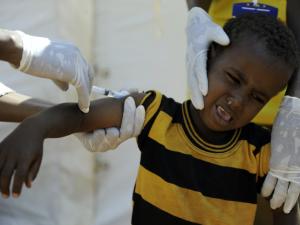Somalia’s polio outbreak worsens
Mogadishu –
Aid workers in war-torn Somalia are struggling to  contain a dangerous outbreak of the crippling polio virus, with rampant insecurity hampering efforts, the United Nations said on Friday.
contain a dangerous outbreak of the crippling polio virus, with rampant insecurity hampering efforts, the United Nations said on Friday.
Six years after the Horn of Africa nation was declared free of the virus, at least 105 cases have been confirmed in Somalia, the “worst outbreak in the world in a non-endemic country”, the UN Office for the Co-ordination of Humanitarian Affairs (OCHA) said in a statement. “The polio outbreak plaguing Somalia has spread despite significant efforts to curb the disease,” OCHA added.
A young Somali refugee gets vaccinated at
a paediatric vaccination centre at the
Hagadere refugee site in this 2011 file photograph.
While four million people have been vaccinated, getting drugs to more than 600 000 children in southern and central Somalia – areas partly under control of the al-Qaeda linked Al-Shabaab, who block vaccination efforts – is “extremely challenging”, it added.
“The inability to fully access these areas constitute a major threat to the control of the outbreak,” the statement read, warning that “Somalia remains one of the most difficult and dangerous environments in the world for aid workers”.
While over 100 cases of children have been recorded, “the fact that this number of children show symptoms of paralysis means that there are probably thousands more with the virus, who do not have symptoms, but are capable of spreading it”, OCHA added.
Around 10 cases have also been reported in north-eastern Kenya, which hosts almost half a million Somali refugees in sprawling camps.
In Somalia, while the bulk of cases are in the southern and central regions, the outbreak has also spread to self-declared independent Somaliland in the north-west.
Polio is spread by person-to-person contact, exacerbated by poor sanitation and a lack of clean water.
Multiple armies are fighting for control of southern Somalia, including rival warlords, Islamist extremists and a rag-tag national army backed by a 17 700-strong AU force.
Aid workers report growing attacks on their staff.
On Thursday, the medical aid agency Doctors Without Borders (MSF) closed all its operations in Somalia after 22 years of working in the Horn of Africa troublespot, warning of growing insecurity and “extreme attacks”.
The withdrawal by MSF, an aid agency that has earned a reputation for working in the toughest of conditions, will cut healthcare for hundreds of thousands of Somalis.
MSF blamed “armed groups and civilian leaders” who it said “increasingly support, tolerate, or condone the killing, assaulting, and abducting of humanitarian aid workers”. – Sapa-AFP


